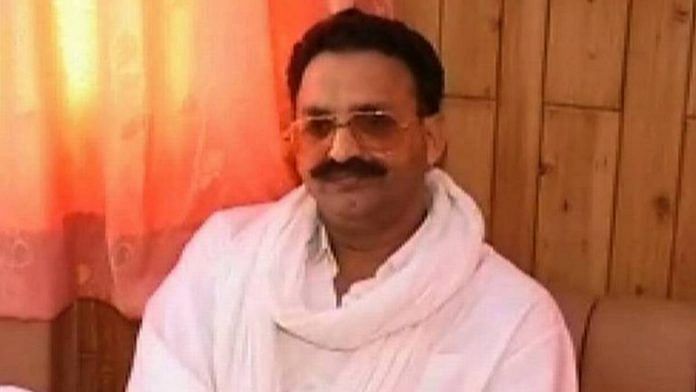
New Delhi: Breaking the deadlock over the custody of gangster-turned-politician Mukhtar Ansari, the Supreme Court Friday ordered the Punjab government to hand over his custody to Uttar Pradesh within two weeks.
A bench led by Justice Ashok Bhushan delivered the verdict on a petition filed by the UP government in December 2020.
Ansari, who has been lodged in the Ropar jail in Punjab since January 2019, has trial pending in 10 criminal cases in a special court in Prayagraj. The FIRs against him are registered under various sections of the Gangster Act and Indian Penal Code, including murder charges.
The sitting Bahujan Samaj Party MLA from Mau in UP assembly had been transferred to Punjab following a production warrant, issued by a Mohali court, in connection to an extortion case on 22 January 2019.
Since then, he has managed to avoid 26 court warrants issued against him by the Prayagraj court on medical grounds. He is said to be suffering from hypertension, diabetes, back pain and skin allergy.
As a result, the UP government was “forced” to move the Supreme Court under Article 32 (right to move Supreme Court if a fundamental right is violated) to ensure that the cases pending against him can be concluded.
In its petition, UP further alleged that the Punjab government named Ansari as an accused in the extortion case as part of a conspiracy hatched between the two to protract the trials.
The top court bench invoked its extraordinary powers under Article 142 to order the transfer of Ansari’s custody, dismissing Punjab’s stiff opposition.
However, the bench did not transfer the criminal case against Ansari from Mohali to UP, observing that it was still under investigation.
‘Courts won’t be helpless bystander when law challenged with impunity’
During the hearing, Punjab had argued that a state cannot file an Article 32 petition since it is a remedy available to an individual person.
Analysing the concept of fair trial as a facet of Article 21 (right to life and liberty) of the Constitution, the Supreme Court, however, said that a state’s role is to take care of the interest of all — the accused, prosecution and the victim — and is therefore competent to file an Article 32 petition.
Though the top court refrained from giving any opinion on the merits of the allegations of conspiracy made by UP, it did observe in its judgment that Punjab denied custody to UP Police every time on “trivial grounds, under guise of medical grounds by mentioning ordinary diseases like diabetes mellitus, skin allergy, hypertension, backache, throat infection”.
But the bench also categorically stated that a “convict or an undertrial prisoner, who disobeys the law of the land, cannot oppose his transfer from one prison to another, be a convict or an undertrial prisoner”.
“Courts are not to be a helpless bystander, when the rule of law is being challenged with impunity,” the judges said.
The Supreme Court further said that Ansari will be lodged in the district jail of Banda, adding that the special court in Prayagraj can move him to any other jail in UP, if the need arises.
A direction was also given to the Banda jail superintendent to extend the necessary medical facilities to Ansari.
The court made it clear that if any specialty treatment is required, the Jail Superintendent shall take necessary steps to extend such medical care also, by following the jail manual.
Ansari’s ailments minor, cannot oppose transfer of his custody
In its petition before the Supreme Court, the UP government had sought Ansari’s custody as well as transfer of the criminal case against him in Mohali.
The state government submitted that court warrants were returned and unexecuted by showing minor ailments.
Furthermore, Ansari had also not applied for bail in the extortion case even though he was entitled to do so. The charge sheet in the case was not filed by the Punjab Police within the stipulated time of 90 days, which ended in March 2019, and therefore, Ansari could apply for bail.
Punjab opposed the petition on the grounds that the investigation in the Mohali case was pending and that the court did not have the power to transfer a case at the stage of investigation.
Ansari also opposed the UP government’s petition claiming that his life was under threat in the state.
The top court bench said that it was “suspicious” that Ansari did not apply for bail, even though he was entitled to.
Considering it to be a fit case to invoke Article 142, the bench noted: “The arms of law are long enough to remedy the situation. If there are any medical ailments to the petitioner, every care shall be taken by the Jail Authorities but, at the same time, on the spacious plea of ill health by referring to minor ailments, the accused (Ansari) cannot oppose the relief, as sought for in the writ petition.”
(Edited by Rachel John)
Subscribe to our channels on YouTube & Telegram
Why news media is in crisis & How you can fix it
India needs free, fair, non-hyphenated and questioning journalism even more as it faces multiple crises.
But the news media is in a crisis of its own. There have been brutal layoffs and pay-cuts. The best of journalism is shrinking, yielding to crude prime-time spectacle.
ThePrint has the finest young reporters, columnists and editors working for it. Sustaining journalism of this quality needs smart and thinking people like you to pay for it. Whether you live in India or overseas, you can do it here.